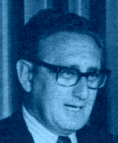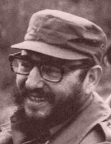State Department 9 June 1975 MemCon, "Cuba Policy" on Henry Kissinger's Attempted Détente with Castro






Cuba broke back into the news in the past month just in time to focus extraordinary public attention on the results of a three-year Archive project to uncover the hidden history of U.S. policy towards Cuba. The October 6 issue of The New York Review of Books features a 6,000-word article by Archive senior analyst Peter Kornbluh and James Blight of Brown University titled "Dialogue with Castro: A Hidden History," laying out the previously secret story of then-Secretary of State Henry Kissinger's failed attempt to achieve a détente with Fidel Castro in the mid-1970's -- a story with many lessons for today's U.S.-Cuba policy choices.
With the New York Review, we staged a press conference to release the article and the documents, and you may have seen part of the ensuing media splash over the past month, as the immigration crisis in the Florida Straits brought the Clinton administration and the Castro regime to the negotiating table. Peter and Jim's article also appeared in edited or translated versions in the Miami Herald and Proceso magazine in Mexico City. Our September 8 press conference was broadcast by C-SPAN; the Associated Press story by George Gedda on the press confer ence ran in dozens of newspapers across the country-and Peter appeared on National Public Radio's All Things Considered and in a score of other radio and TV interviews.
Working from a single 1977 newspaper story and hints in several books on U.S.- Cuba relations, Peter Kornbluh and his colleagues James Blight, Janet Lang, Philip Brenner and Jorge Domínguez, unraveled this tightly-held story through a series of oral history and interview sessions with Kissinger and his top aides Lawrence Eagleburger and William Rogers, with the Cuban emissaries who negotiated with the Americans, as well as with various private intermediaries who played a role in the talks. With help particularly from Bill Rogers (former Assistant Secretary of State for Latin America), Peter was spectacularly successful in gaining the declassification of key State Department papers which documented this previously secret initiative.
The enclosed document-of-the-month is in many ways the most thought-provoking of the newly released secrets, providing great insight into Kissinger's decision-making. One of Rogers' deputies, Culver Gleysteen, took notes of one of the key meetings during the initiative, on June 9, 1975, including Kissinger, Eagleburger, Rogers, and Winston Lord (Lord now serves the Clinton administration as Assistant Secretary of State for East Asian and Pacific Affairs). The group discussed the upcoming meeting in San Jose, Costa Rica, of the Organization of American States, where the OAS would vote to remove multilateral sanctions on Cuba, and various pressures from Canadian business interests and from members of Congress for dealing directly with Cuba. These notes contain Kissinger's remarkable directive for dealing with Castro: "Behave chivalrously; do it like a big guy, not like a shyster. Let him know: We are moving in a new direction;... we'd like to synchronize; steps will be unilateral; reciprocity is necessary." Enjoy your reading.
Return to the National Security Archive home page
The National Security Archive,
The Gelman Library, George Washington University
2130 H Street, NW, Suite 701, Washington, DC 20037
Phone: 202-994-7000 / Fax: 202-994-7005
Internet:
nsarchiv@gwis2.circ.gwu.edu
Last Change: July 29 1996 / by Reza Rafie/ rafie@seas.gwu.edu